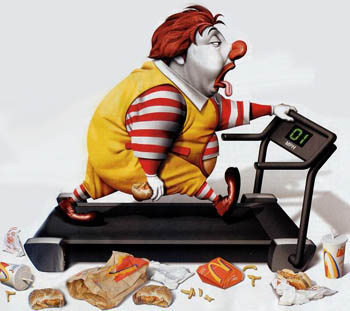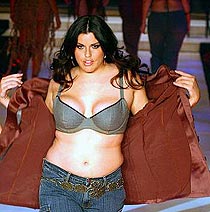|
|
|||||||||||||||||||||||||||||||
|
Boosting your Metabolism and Losing Weight
Arm Yourself with Time Tested Principles for Speeding Up Metabolism and Boosting Digestive Fire By Michael Vertolli, Clinical Herbalist I am often asked what I believe to be the most important recommendations for achieving, maintaining and optimizing our overall level of health and well-being. Although this is a very complex question and any answer will inevitably be a gross over-simplification, I consider the four pillars of health to be eating a healthy diet, getting lots of exercise, reducing exposure to the various forms of toxicity, and maintaining a positive attitude. Volumes can and have been written on each one of these recommendations and itís important to keep in mind that there are no absolutes. What constitutes a healthy diet or lifestyle for one person is not necessarily healthy for someone else, nor even for the same person at different times in their life. In addition, the strategies that need to be employed to achieve these goals cannot be generalized. They must take into account the circumstances and needs of each individual.
Thousands of books have been written on various aspects of healthy living and, sadly, most of them arenít worth the paper theyíre printed on. The typical pop health book is based on a tidbit of reductionistic pseudoscience, personal experience, or some baseless rationalization. Regardless of the initial inspiration, the principles tend to be unrealistically extrapolated to encompass all of human experience. If you come across a book that claims to have the answer for everyone, throw it away Ė there is no such thing! One of the subjects that is rampant with misinformation and useless or even dangerous fad products is the issue of weight loss. This is not surprising as the number of North Americans who are overweight is rapidly rising in spite of the fact that the medical establishment is constantly preaching about the very real health risks that are associated with increased excessive weight, and on the other side we have Hollywood and the fashion industry portraying the ideal body image as something that resembles an anorexic 16 year old. None of us are perfect. We all have issues that we are struggling with in our life. However, those of us who have difficulty maintaining a healthy weight wear our struggles out in the open for all to see. This is not something that can be hidden. As a result, it is no surprise that a personís weight can be intimately tied to their self-image and self-esteem. For many, in their desperation they may fall prey to fad diets and dieting products. The number of people in this predicament is very large and growing: thus the huge market for dieting books and products. Obviously, it is not possible to fully explore the issue of weight reduction in a short article. That would take hundreds of pages and still require a lot of experimentation on the part of each individual to find what works for them. What I can do is give some basic recommendations and debunk some of the more common myths that are perpetuated by the fad diet gurus.
Our weight is a direct result of the number of calories (i.e. energy) that we consume and the number of calories that we burn. The math is very simple: when we consume more calories than we burn, we gain weight; when we consume less calories than we burn, we lose weight; when we consume the same number of calories that we burn, our weight stays the same. Figuring out the number of calories that we consume is also pretty straightforward. It is determined by the quantity and the energy density of the foods that we eat. Non-starchy fruits and vegetables tend to have the fewest calories per gram. Whole beans and grains tend to have more. Simple carbohydrates and high protein foods have more still, and foods that are high in fats and oils contain the most calories. There are, however, aspects of our diet that are not so simple. Our food choices are often influenced by psychological issues. Some people use different kinds of foods as a means of relieving or avoiding stress. Others, as a source of emotional gratification. Some people are very rigid and refuse to try anything that is new or unfamiliar. Others indulge in food as a source of pure hedonistic pleasure. Our appetite can also be influence by our eating habits. It takes time for our body to signal when it is satiated. If we eat quickly or in a stressful environment with our mind focused on other things, we may eat more than we need before our body has a chance to signal that it has had enough or we may not notice these signals when they occur. Our digestion is also a factor. If our digestive system is not functioning well, it may influence the efficiency of the physiological signals that indicate hunger or satiation. In addition, poor diet and eating habits will inevitably lead to poor digestion which affects our appetite and eating habits and onward in a downward spiral.
Determining the amount of energy that we burn in a day is much more complex. It primarily depends on our activity level and our metabolic rate. The relationship between our activity level and the number of calories that we burn is straightforward: the more active we are the more calories we burn. Our metabolic rate, however, depends on many factors including: our activity level (increased activity tends to increase metabolic rate); gender (women tend to have a lower metabolic rate); age (metabolic rate tends to decrease with age); and weight (as our weight increases our metabolic rate tends to decrease). There are other more complex factors that also influence our metabolic rate. Stress tends to increase metabolic rate but excessive or prolonged stress leads to endocrine dysfunction, particularly of our pituitary, adrenals, thyroid and pancreas. Disturbances of the functioning of one or more of these organs will usually eventually lead to a decrease of our metabolic rate. Over consumption of foods that have a high glycemic load (i.e. cause a rapid increase in blood sugar levels) can lead to insulin resistance. This also tends to lower our metabolic rate. Our metabolism can also be influenced by our level of tissue toxicity. Finally, we mustnít forget that there are genetic factors that come into play as well. As you can expect from the information above, the level of energy input and energy burned that will result in a person maintaining a particular weight is going to vary from individual to individual. That is why some people can lose weight easier than others. This must be taken into account in any attempt to create a weight loss regimen for any given person. It is also necessary to determine if there are any complicating factors such as endocrine or digestive dysfunction, or toxicity. These must be addressed if we hope to reduce weight successfully.
There are no magic bullets when it comes to weight management, regardless of what the diet gurus say. The only way to reduce weight is to create a healthy, long-term diet and lifestyle that works for you. A common mistaken assumption is that we can go on some kind of weight loss diet and then go back to eating the same way we did before, once we reach a desirable weight. Nothing could be further from the truth. Our current diet and lifestyle is the one that resulted in our current weight level. No matter how much weight we lose, if we go back to living the way we did before, we will eventually end up weighing the same as we did before Ė or more since our metabolism tends to slow down with age. Similarly, the diet and lifestyle that allows us to lose a certain amount of weight is going to be similar to the diet and lifestyle we need to maintain if we want to keep it off. There are no temporary measures. The only way to reach a healthy weight and stay there is to create a healthy diet, exercise program and lifestyle that we can comfortably continue for the rest of our life. Letís begin with diet. There is no one diet that works for everyone. Nevertheless, some generalizations can be made because North Americans tend to make many of the same poor dietary choices. Here are some general recommendations that will improve the diet of anyone if put into practice. Specific variations can be made based on the needs of each individual:
1. Increase consumption of whole, organically grown or raised foods and decrease consumption of processed foods and foods that contain chemical additives and preservatives. 2. Eat lots of variety. 3. Increase consumption of non-starchy fruits and vegetables. 4. Decrease consumption of animal products, especially dairy products and red meats. If you eat animal protein, the best choice is organically raised poultry and eggs. 5. Decrease consumption of fried foods and foods that contain a lot of added vegetable oil or animal fat. Eliminate foods containing hydrogenated or partially hydrogenated oils. 6. For salads and cooking use extra virgin olive oil. Also take 1-2 teaspoons of flax oil per day in food or as a supplement. Never heat flax oil. 7. Increase consumption of whole grains such as brown rice, quinoa, spelt, kamut, barley, cornmeal, millet, buckwheat, etc. 8. Increase consumption of beans. 9. Decrease consumption of foods with a high glycemic load such as sweets and natural sweeteners, soft drinks, fruit juices, white and whole grain flour products (unless they are made from stone-ground whole grain flour) and puffed grains. Artificial sweeteners are not recommended because they are unhealthy and perpetuate our desire for sweet tasting foods. 10. Decrease consumption of caffeine containing beverages, especially coffee. 11. Reduce snacking. Fresh fruit is the only acceptable snack. Always drink some water after eating fruit. 12. Drink 125-250 ml (4-8 oz) of spring or filtered water 6-8 times per day. Donít drink water that has been stored or transported in soft plastic containers. Herbal tea without sweetener or milk is an acceptable substitute for some of the water. 13. Only eat when youíre hungry and never eat until youíre bloated. 14. Donít eat or drink anything except water or herb tea for at least 3 hours before bed. 15. Donít eat for at least 1 hour after waking in the morning. 16. Eat slowly, in a relaxed state and chew your food well.
If you follow these recommendations you are on the road to healthy eating. The greater the degree to which you apply them in your life the better, but itís important to make changes a little at a time. Extreme changes are usually too stressful and canít be maintained in the long run. Itís also important that you enjoy your diet. If you find it bland or unpleasant it will not be sustainable. In general, recipes based on traditional cuisine from around the world are likely to be easier to digest and nutritious as long as theyíre based on natural ingredients. The key to using this healthy diet template for reducing weight is to reduce calories. This can be done by eliminating snacking, eating smaller portions and shifting the emphasis towards more fruits and vegetables and less high fat and high protein foods, or foods with a high glycemic load. Although gram for gram fat contains the most calories, not all fat is unhealthy. Some fats are good and others are essential. So I recommend eating small amounts of nuts and seeds and using olive and flax oil. Eat only raw, unhulled nuts and seeds. Almonds and Brazil nuts can be eaten hulled. Fad Diets Donít Work There are many fad diet philosophies that people buy into in their desperation to lose weight. One category of diet that I must mention because it is very popular and equally unhealthy, is the high protein/low carbohydrate diet. This diet is based on the incorrect assumption that all carbohydrates are bad, or some kind of romantic rationalization about what humans supposedly ate in the distant past. There is now a significant amount of evidence from long-term epidemiological studies which indicates that the diets associated with the healthiest weight and lowest incidence of chronic degenerative diseases are those that are mostly or completely vegetarian. When someone switches to a high protein/low carbohydrate diet, they will often lose 10-15 pounds very rapidly. This is interpreted as a sign of the effectiveness of the diet. The truth is that reduced consumption of carbohydrate leads to rapid depletion of glycogen stores. Glycogen is a starch-like compound that our body makes to store energy in a form that is easily accessible. Glycogen is osmotic Ė it attracts water. When stores of this substance are depleted, the water it attracts is eliminated from our body, thus the rapid weight loss. As soon as we start eating carbohydrate again, our glycogen stores are replenished (as is the water content of our tissues) and we will rapidly regain that weight. The real problem with these diets is that they result in increased production of toxic waste products that will have significant negative health consequences. Carbohydrate is the ideal source of fuel for our body because it can be metabolized without producing the toxic waste products that result from burning protein and fat. Itís like comparing natural gas with coal as a fuel source. Proponents of high protein/low carb diets perpetuate the myth that all carbohydrates are bad. The truth is that the health problems attributed to carbohydrates are the result of overconsumption of high glycemic load carbs, the ones that lead to a rapid increase in blood sugar levels.
Exercise for Weight Loss The flip side of a healthy lifestyle that will help us to reduce weight is increasing our activity level. It is impossible to lose weight without regular exercise. This must be done on two levels. Firstly, by increasing our overall activity level. That means spending less time engaged in sedentary activities like sitting in front of a television or computer, and more time walking, biking, skating, playing sports and other activities such as a more active style of yoga or a tai chi program. In addition, it is essential to practice regular aerobic exercise at least three times per week. The key here is to find activities and exercises that work for you and you enjoy. Some find it helpful to have support or social interaction. Playing sports or going to a gym works better for them. Others may have difficulty fitting exercise into their busy schedule. Having the right equipment at home makes it easier. You donít need expensive equipment. Inexpensive options like a skipping rope will do. Whatever you chose, it is important to make sure that you work out both your upper and lower body. It is best to reduce calories and increase exercise very gradually. If we lose weight too rapidly our body will go into a fasting mode and metabolism will slow down. It will therefore become increasingly more difficult to lose weight. Also, the more weight we need to lose, the slower we should go. This is because the more we weigh, the greater the stress on our body. If we suddenly initiate a vigorous exercise program, we will be putting a tremendous amount of stress on our joints, heart, lungs and other organs. We will also be releasing large amounts of toxins into our blood that were stored in the fatty tissues that we are breaking down. Herbs to Aid Weight Loss There are two herbal approaches that can be of some use. The first involves using mucilaginous bulk supplements. Add two tablespoons of organic psyllium husks or whole flax seeds (or a mixture of both) to a glass of warm water and drink it quickly before it gels completely. It is also a good idea to add a bit of probiotic (acidophilus, etc.) powder. This drink has many important health benefits besides improving bowel function. From a weight loss perspective it does two things: it fills us up, thereby temporarily reducing our appetite, and it slows down absorption of sugar, thereby reducing blood sugar spikes and increasing the amount of time before we are hungry again. This can be taken once or twice per day on an empty stomach, preferably about 30-60 minutes before meals. The second useful strategy is to take a good herbal digestive formulation. This should consist of: one warming digestive herb such as ginger rhizome (Zingiber officinale), cinnamon bark (Cinnamomum verum), turmeric rhizome (Curcuma longa), wild bergamot herb (Monarda fistulosa), thyme herb (Thymus vulgaris) or rosemary herb (Rosmarinus officinalis); one bitter herb such as yellow gentian root (Gentiana lutea), centaury herb (Centaurium erythraea) or white horehound herb (Marrubium vulgare); and two or three non-warming carminative herbs such as German chamomile flowers (Matricaria recutita), Roman chamomile flowers (Chamaemelum nobile), English lavender flowers (Lavandula angustifolia), lemon balm herb (Melissa officinalis), spearmint herb (Mentha spicata), catnip herb (Nepeta cataria) or hyssop herb (Hyssopus officinalis). This formulation should be taken on an empty stomach, 10-15 minutes before each meal. The best way to take it is as a tincture made from the fresh herbs. You will need to adjust the levels of warming and bitter herbs so that the formulation is not too hot (spicy) or bitter. However, try to take it as bitter as you can tolerate since the bitterness of the formulation is very important for its effectiveness. It is also important that the tincture be held in your mouth for 30-60 seconds as the bitterness must be tasted for the full effect. This kind of formulation has many important health benefits, including a number that will aid weight loss. It will improve digestion and, although it increases appetite, your appetite will also be satiated more quickly and for a longer period of time as the formulation will help to stabilize blood sugar levels. In addition, it will improve endocrine function and may increase your metabolic rate slightly, but only if it is low due to poor endocrine function. As you can see, losing weight is not about trying the latest crash diet in order to feel comfortable showing more skin in the summer. It is about creating a long-term healthy diet and lifestyle that we can feel good about and will help us to achieve a greater state of health and well-being. Avoid the quick fixes and do it right and the pounds will drop off eventually and stay off. Even more important, youíll feel great!
|
|
||||||||||||||||||||||||||||||
|
Website Design + SEO by designSEO.ca ~ Owned + Edited by Suzanne MacNevin | |||||||||||||||||||||||||||||||







